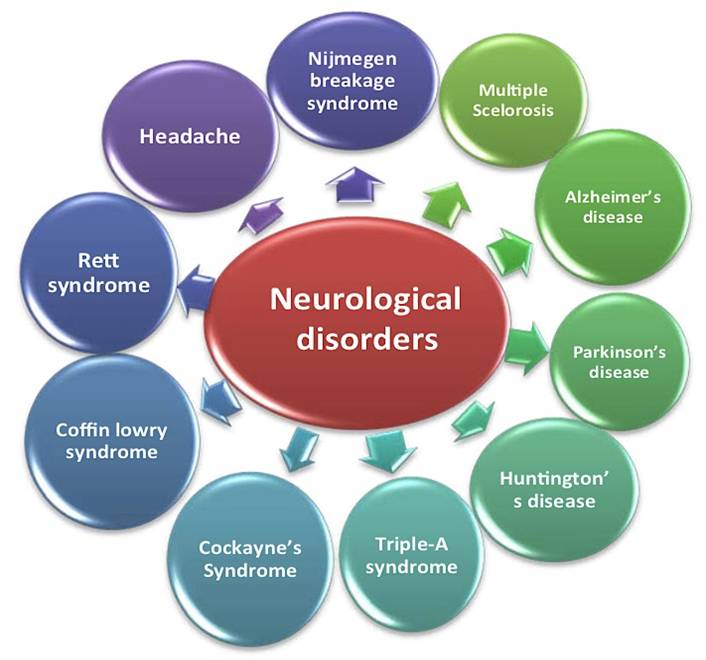Gene Therapy Development for Neurological Diseases
Neurological disorders that impact the central nervous system (CNS), such as Parkinson's disease (PD), amyotrophic lateral sclerosis (ALS), and stroke, are serious issues for both patients and clinicians. Traditional pharmacological approaches are difficult to treat these disorders complexity of the nervous system and physical barriers that limit distribution of medications. Mediated through the delivery of exogenous nucleic acid into CNS, gene therapy has emerged as a promising alternative strategy and this technique has been performed in several nervous system disorders. Empowered by extensive experience and state-of-the-art equipment, Creative Biolabs has been a world-leading service provider in the area of gene therapy. Our professional scientists can conduct many custom design and tests to help with your development of gene therapy for CNS disorders.
 Figure 1. Common Neurological Disorders (Tripathy 2011)
Figure 1. Common Neurological Disorders (Tripathy 2011)
Featured Services for Neurological Disorders Gene Therapy Development
-
Parkinson's Disease
Parkinson's disease (PD) is a progressive nervous system disorder characterized by selective degeneration of dopaminergic neurons in the substantia nigra pars compacta and severe decreases in striatal dopamine (DA) content. The symptomatic approach based on gene therapy for PD involves enzyme-replacement strategy and disease-modifying approach that depends on addition of neurotrophic factors. For example, intrastriatal expression of key enzymes for DA biosynthesis can compensate for the decreased levels of DA in PD patients. In addition, the neurotrophic factors including glial cell line-derived neurotrophic factor (GDNF) and neurturin (NTN) are extremely promising candidate therapeutic genes for PD treatment.
-
Huntington's Disease
Huntington's disease is an autosomal-dominant neurodegenerative disorder that causes the progressive breakdown of nerve cells in the brain. There is no effective therapy for HD yet, and gene therapy can be a good candidate option for this single-gene disorder. It is documented that reducing mutant huntingtin (HTT) expression may offer a treatment for HD, such as by the delivery of short RNAs to block production of the dysfunctional HTT protein. Like the PD therapy, neurotropic factors including GDNF and NTN have also been studied extensively in HD model and improvements have achieved through the vectors-mediated GDNF and NTN gene transfer.
-
Stroke
Ischemic and hemorrhagic strokes are two main types of stroke and occur when a blood vessel in the brain ruptures and bleeds, or when there's a blockage in the blood supply to the brain. Gene transfer approach may reduce effects of cerebral ischemia or subarachnoid hemorrhage (SAH). It is reported that the ischemic damage can be reduced by the intracerebral injection of an adenovirus vector overexpressing neuronal apoptosis inhibitory protein (NAIP) in the rat hippocampus. Additionally, many growth factors also possess the neuroprotective effects for brain ischemia injury including GDNF and NGF that have been delivered via rAAV vector for stroke gene intervention.
With capabilities of various transgene expression assays, multiple analysis technologies and instruments, Creative Biolabs has established a powerful advanced platform which can be used to test your preclinical validation of gene therapy products against neurological disorders. We are committed to offering the high quality gene therapy development services for our clients all over the world. Please don't hesitate to let us know your demands, and our team will get back to you as soon as we can.
Reference
- Deverman, B., Ravina, B., Bankiewicz, K., Paul, S. and Sah, D. (2018). Gene therapy for neurological disorders: progress and prospects. Nature Reviews Drug Discovery, 17(9), pp.641-659.
- Tripathy, K. (2011). Epigenetic and Therapeutic Analysis of various Neurological Disorders. Journal of Genetic Syndromes & Gene Therapy, 2(3).
- Choong, C., Baba, K. and Mochizuki, H. (2015). Gene therapy for neurological disorders. Expert Opinion on Biological Therapy, 16(2), pp.143-159.
